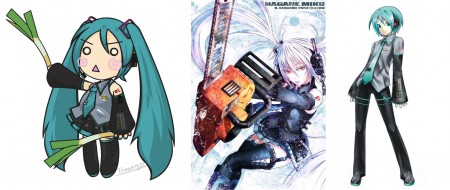Ask John: Why Doesn’t a Vocaloid Anime Exist Yet?
Question:
Why do you think no Hatsune Miku anime series has come out yet? To me it seems like a no brainer, considering all the available music, video games and other merchandise available. With the multiple vocaloids already in existence you’d have quite a large cast. All that you would need is a story to put the characters in and some new tunes. Even if it sucked you’d have a lot of cash generated from it.
Answer:
On one hand I agree with the rationale behind the question. Hatsune Miku and most of her fellow Vocaloids have become massive international celebrities, and they appear in an assortment of manga and video games, not to mention an endless variety of merchandise. Similar mascot idols including Super Sonico, Rio, and Francesca have gotten their own anime television series, so precedent would suggest that Hatsune Miku would likewise follow suit.
The seemingly only logical explanation is a rather arbitrary but justifiable one. Crypton Future Media, the developer of the Hatsune Miku character, comissioned character designer “Kei” to create a visual image of Hatsune Miku with only the stipulations that the character be a turquoise colored android. Miku’s official statistics state only her age, astrological sign, weight, and physical dimensions. Crypton Future Media intentionally refused to give Miku a background or personality in order to allow users to adapt the character freely. As a result, Hatsune Miku has inspired variations including the super-deformed “Hachune Miku,” the heavy metal Hagane Miku, the male Hatsune Mikuo, and Black Rock Shooter.
Original character designer Kei’s “Unofficial Hatsune Mix” manga has the stipulation “unofficial” right in its title and consists of an anthology of stories placing Vocaloids in different stories and backgrounds. An “official” Hatsune Miku anime could certainly also present the character in a variety of situations, environments, and backgrounds, but Crypton Future Media seems to be hesitant to possibly typecast Miku into a particular characterization via an anime. Allowing video games to depict Vocaloids as human high school students or digital avatars but not allowing a conventional TV anime to do the same does seem to be an arbitrary distinction, but it’s a line in the sand that Crypton Future Media has a right to make. After all, the transition of Vocaloids from one variety of interactive software to another isn’t a big step. But the transference of Miku from an amorphous digital avatar to a specifically personified anime character may be a leap in characterization that Crypton Future Media doesn’t want to see established and solidified.
Add a Comment
You must be logged in to post a comment.



Vocaloid anime does exist, sort of. It’s called Miss Monochrome, and it came out maybe a year ago.